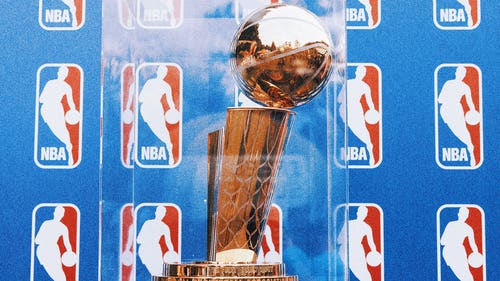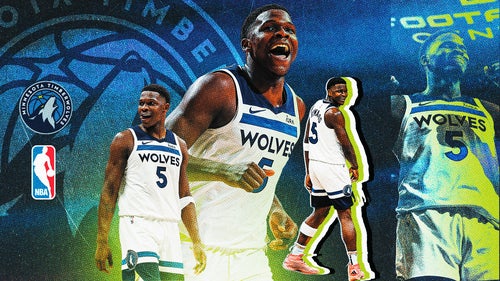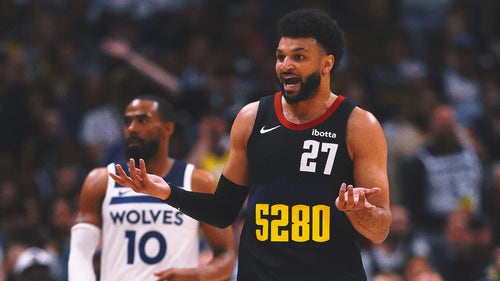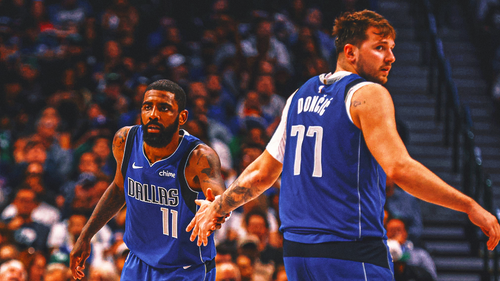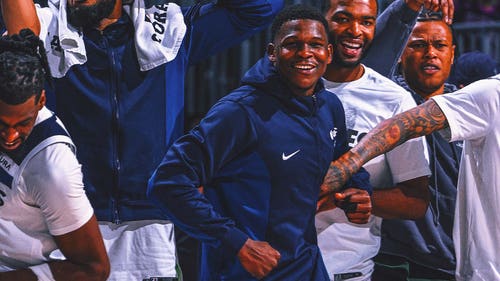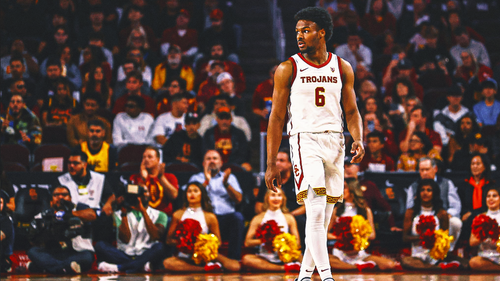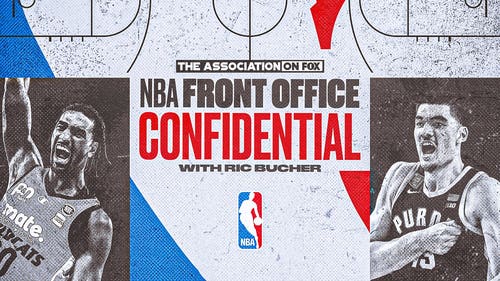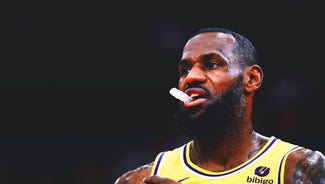
Why Jordan Poole is okay being the NBA's meme king
Jordan Poole wants to share his side of things, but he's also wary of doing so.
He knows if you've watched the NBA this season, or consumed the league at all on social media, you've no doubt come across some sort of clip of him with a few LMAO emojis or a pithy one-liner.
He also knows how these things usually work, how once you become, to use his words, "a hot topic, which it seems like I am now, and have been even the last couple of years, if we're being realistic," there's not much you can say to dispel what the public thinks about you.
And he's right. Shedding a label is hard for any public figure, and even harder for an athlete on a bad team performing on TV every other night. Sure, he could pretend he has been humbled. But Jordan Poole isn't exactly the pretending type.
"I'm never shying away or like stepping back because of a little bit of criticism," the 24-year-old Washington Wizards guard said.
It was January, and Poole had just wrapped up a morning shootaround at Madison Square Garden. He was pulling on his sweats when I approached him and said I was interested in writing about this strange place he currently occupies within NBA culture. Which can basically be summed up as: He has become the butt of the joke.
This started last fall, when Poole transformed from the free-spirited Steph Curry understudy into the guy punched in the face by Golden State Warriors teammate Draymond Green. His impulsive play had already made him a lightning rod, but that vicious right hook — and the fact that video of the incident was leaked — thrust Poole's attitude and game under an even brighter spotlight.
A few weeks later, the Warriors signed Poole to a four-year, $124 million extension, and he repaid them by averaging 20.4 points per game, but in July they traded him to the Wizards in exchange for a package centered around Chris Paul.
D.C. was supposed to represent a fresh start for Poole. He was excited. Not just because his time in Golden State had clearly run its course but because he was elated about having the opportunity to walk into a rebuilding franchise and lead the way, just like he'd watched Steph and Klay and Draymond do all those years. He even started preparing a players' only offseason minicamp for a few hours after being traded.
"One thing we always talked about was that he wanted the chance to one day have his own team," said Wizards forward Isaiah Livers, who played college ball with Poole at Michigan and has since been one of his best friends.
This is the point where NBA fans will laugh. And who could blame them? Since arriving in D.C., Poole has been, well, bad. He owns the league's second-worst effective field-goal percentage. He ranks in the bottom-three in all sorts of advanced, catch-all statistics such as box plus-minus, value over replacement player and win shares. He's playing for a Wizards team that has won a league-low 11 games and yet has somehow been even statistically worse with Poole on the court.
And then there's all the other stuff. Like the time he launched a 3-pointer from the corner in front of the Memphis Grizzlies' bench, turned, posed — only to have the shot rim out a la Nick Young. Or the time he casually walked the ball back to the 3-point line, like a kid after a stop in play, and flipped up a shot from deep — only to have Kristaps Porzingis block it. Or the time he paused for effect after breaking free with a wicked crossover against the Detroit Pistons — only to have his floater swatted by Ausar Thompson. And who can forget the time he tossed an off-the-backboard alley-oop to teammate Kyle Kuzma in a game in which his Wizards trailed by 21 points?
At first Poole was reluctant to engage on any of this. But after a few questions, his tenor changed. He was sharing his thoughts about social media, on how he approaches basketball, on adjusting to a new offensive system, on what it's like being Jordan Poole right now.
"Everything that I've done [in my career] has essentially worked," he said of the outside criticism. "So there's no need to change anything. Just find ways to get a little bit better, wherever I can."
While talking to him, and other close friends of his, I learned there's a reason he approaches the game the way he does. To reach the heights he has — NBA champion, $100 million-plus contract — has required a level of arrogance. Poole has spent his basketball life pushing back on the limitations imposed on him by others and been validated virtually every time.
The question now is whether this season is an aberration — a result of everything that could go wrong going wrong and all at the same time and, because of that, just another blip on his basketball journey — or a preview of the rest of Poole's career. You might think the answer is obvious. And, at this point, it'd be hard to argue. But you should at least hear why Poole, those closest to him and the Wizards believe otherwise.
* * *
NBA players, generally speaking, are confident. You can't accomplish what they have — there are 450 million people playing basketball around the world, according to the United Nations, yet only about 500 people each year get to claim the title of NBA player — without a combination of self-belief and conviction that most humans couldn't even fathom.
And yet, even compared to these standards, people around Poole describe him as an anomaly, the type of player who makes these other supremely confident men look sheepish. This isn't a learned behavior, either. Poole has always been this way, always had a never-ceasing confidence in himself. It's his superpower, the catalyst for his success.
For example, let's rewind 10 years, to Poole's freshman year of high school. His team is in the sectional semifinals.There's less than a minute left and Poole's Rufus King is trailing by three. His coach, Jim Gosz, is walking up and down the sideline when he hears a plea coming from the bench.
Put me in, coach, put me in.
Gozs looks up and sees that the words are coming from the team's approximately 5-foot-7, 125-pound eighth man. But Gosz also knows that this reserve is as skilled a scorer as anyone on the roster, and figures why not. With less than 10 seconds left, Poole catches the ball on the right wing, deep behind the 3-point arc and fires away. The ball rips through the net, tying the game.
Fast-forward six years. It's the summer after Poole's freshman year at Michigan, and he's riding around campus with a teammate, Naji Ozeir, and Ozeir's older brother. They're cruising and chatting and at one point Ozeir's brother asks Poole what his plans are for the following summer.
"I'm going to the NBA," Poole replies.
Ozeir and his brother are stunned. Neither knows what to say. Sure, Poole was a top-100 recruit coming out of high school who had flashed some talent as a freshman, and the buzzer-beating 3-pointer he drilled in the second round of the NCAA Tournament has put him on the map. But he's so young (his birthday is June 19 and he never reclassified, meaning that upon entering Michigan he was nearly a year younger than the majority of his fellow freshmen) and so thin and still so raw (25 turnovers compared to 22 assists as a freshman) that, just a few months earlier, head coach John Beilein had relegated him to the third team on Michigan's squad. That group nicknamed itself The Plastic Cup Boys, a nod to their job of providing the team's stars with water during games. Poole finished the season averaging 6.1 points in 12.5 minutes per game.
As a sophomore, Poole earns more trust from Beilein and doubles his scoring output. But Beilein and his staff tell him that, in their view, leaving school would be a mistake. They don't believe Poole is ready, on or off the court. Poole's attention to detail, especially on defense, is lacking. His shot selection is overly ambitious. He's brash and talks a lot of trash, traits that bother some NBA scouts. An ESPN mock draft pegs him as the 42nd overall pick.
Poole doesn't care. The draft arrives and Poole is grabbed by the Warriors in the first round, 28th overall. He's given a guaranteed eight-figure contract and a chance to be teammates with an NBA legend whose game he'd like to emulate, Steph Curry.
"We thought he was nuts," Ozeir recalled recently. "Yet in the end, it turned out that he was 1,000% right."
Now fast-forward one more time. It's Poole's rookie season with the Warriors, and he's struggling. He can't make a shot (he'd finish the year shooting 33.3 percent from the field and a league-worst 27.9 percent on 3-pointers) and he's taking so many awful ones. He's getting roasted on defense. He's still talking so much trash. He's lost the trust of his teammates.
"He was not the easiest to play with," said Warriors center Kevon Looney, a fellow Milwaukee native and close friend of Poole's.
The Warriors send him to the G League for stints. Nothing changes, nothing helps. He returns from his G League assignments boasting the same attitude, the same mentality, launching the same shots.
"In my head, I remember being like, ‘So you're not gonna change things at all?'" said Glenn Robinson III, another Michigan alum who played for the Warriors during the 2019-20 season. "But that's just not Jordan. He's the only guy I've seen able to keep himself mentally right while being called the worst 3-point shooter or player in the league."
Poole spends the following offseason working hard. The Warriors are impressed and optimistic, and Poole starts his second season hitting more shots. His attitude, though, remains a problem. At least in their view. They send him back to the G League where he logs 11 games. Something clicks. He returns to the Warriors, scores 26 points in 26 minutes in his first game back and becomes an key part of their rotation down the stretch, averaging 14.4 points in 23.4 minutes per game after the All-Star break while shooting 34.8% from deep.
The next season, the Warriors win the title with Poole (18.4 points per game) playing an essential role.
"He's one of the main reasons we won that championship that year," Warriors head coach Steve Kerr told reporters recently. Warriors executives have repeatedly echoed this sentiment in private, too.
After the season, Poole is credited with changing his approach. That's not exactly how he sees it, though. Yeah, he made some small adjustments. He slowed down just a bit. He started recognizing where within the Warriors' system he could get his shots and attacked those spots. But the main difference, in his view, was opportunity.
The Warriors finally trusted him, finally let him get more reps on the ball and Poole, being the person he has always been, the one who Beilein once described as having an "overdose of swag," rewarded them for it. He still took bold shots. He still launched 30-foot bombs. He still strutted around and talked trash. The differences were along the margins.
"It's hard coming into that system," Poole told me. "It's like algebra, and every year I got a little more comfortable. But also in my first year in Golden State, they tried to have me play off the ball more. When they put me back on the ball, I was more effective."
* * *
It's worth noting Poole is more self-aware than he lets on in. At least a bit. The proof is in the work he puts in. "More than most players," a Warriors executive said.
Before offering him the mega-extension, Golden State higher-ups even polled different veterans in the locker room to gauge their thoughts. What they heard back was that if there was anyone who would respond well to getting paid, who would look at a lucrative contract as the beginning of the journey not the end, it was Poole.
That this season is not the first time Poole has struggled in a new setting is something his friends and the Wizards are quick to bring up. He struggled his first season in Michigan and his first in Golden State. It took time, but in both places he turned things around. Which, it's pointed out, would not be possible if he were the sort of person who lacked self-awareness. To take the cliché and turn it on its head: If a problem was fixed then at some point its existence must have been acknowledged. Poole might keep his guard up in public, but clearly he's at least somewhat honest with himself.
"He's a deep thinker, very thoughtful and is great at working issues out over time," said Wizards general manager Will Dawkins, who followed Poole closely in his previous job as a scout and executive for the Oklahoma City Thunder. "He's someone who carefully processes on his own time. He collects his thoughts, takes some notes and is very prepared once we engage in conversation."
"His approach and his growth mindset is very mature," said Carl Bergstrom, the Warriors' former head of performance and a close friend of Poole's.
So, what has gone wrong this season? There are different schools of thought. One theory you hear often in NBA circles — where armchair psychologists are never lacking — is Poole's suffering from some sort of PTSD related to Green punch.
"I think he's still damaged from what happened when he was with us," said one person who worked with Poole in Golden State.
Poole's friends disagree.
"Absolutely not the case," Bergstrom said.
"That's not something we've ever talked about," Livers said.
"It might have affected him trust-wise, in terms of his teammate doing that, but that's it," said DeAndre Haynes, a former Michigan assistant and another one of Poole's closest friends.
What everyone does agree upon, however, is Poole might have underestimated how much he benefited from playing in the Warriors' system and, on top of that, how difficult it would be to adjust to a new one. He might have driven his coaches crazy with his wild shots and careless turnovers.
But in hindsight it has become clear the Warriors offense, with its non-stop movement and controlled chaos, might have been the home most suitable to harnessing both Poole's personality and, by proxy, style.
Those wild shots you saw him take? Those audacious moves you saw him attempt? "I practice everything I do," Poole said. And Curry — the master of stretching the game's bounds — was, in many ways, the perfect player for him to mimic, which he did as much as he could. "If Steph was tossing up shots from half court, Jordan would be right there with him," Robinson said.
You could argue Poole picked up some bad habits. After all, there is only one Steph, and it can be dangerous when others think they can do the same things with the same efficiency. But just know that some of their former teammates do believe Poole and Curry share some traits.
"Jordan thrives in chaos the same way Steph does," said Donte DiVincenzo, who played with both last season. "And the Warriors welcome more chaos than any other team."
Watch Poole play this season and you can see the difference. Poole wants to fly around like a tetherball while everyone else is operating more station-to-station.
"When we were there, he could play with this confidence that was almost borderline of: Was that play a good play? Because you have Steph, Draymond and Klay and that's how they play and that's how they won," DiVincenzo said. "And within that, Jordan would do things where you're like: No, no, no, no, yes! And that's how he'd gain confidence.
"You can tell that right now he's [trying to figure it] out how to do it on the other end of the spectrum. How to be a leader and serious all the while still being himself."
Which, both Poole's friends and the Wizards believe, triggers a chain reaction. More thinking leads to less confidence, which saps some of his aggression, which leads to mistakes, which leads to more thinking, which leads to more and bigger mistakes, which leads to viral moments, which leads to a larger microscope, which leads to even more thinking, and on and on and on it goes.
Just look at the evolution of his gaffes and you can see this cycle playing out. At first, they were flippant, a result of Poole misunderstanding what it meant to be a team's top gun and, as a result, crossing the line from confident into careless. And he got ridiculed for them, deservedly so. But if you look at the recent bloopers, you'll notice they're different. They're not obnoxious; they're just mistakes. Some of which, if they were committed by a different player with a different history, would go unnoticed, like the fastbreak that he and Kuzma botched earlier this week, which went viral. And in a lot of them you can feel him overthinking the play.
A note on this turnover: In the clip that went viral, you don't see the defense. But the reason Poole got confused is because the Wizards had called a play assuming the Nuggets would be playing man-to-man defense, only for Denver to switch to a zone. Again, this doesn't excuse the turnover, but it does help explain it.
Poole, for his part, avoids social media. He hasn't posted on Twitter/X since June and has only posted on Instagram 10 times total. He's not the kind of guy — and his friends attest to this — that goes digging in his mentions or spends hours scrolling through feeds. His approach to social media is a healthy one. He understands it, and understands how it amplifies and rewards outrage. He doesn't begrudge it. He'd just rather not take part.
"I get what it's for, but you can be overwhelmed with that stuff," he said. I can't do anything about it, right? Just live with it. That's our generation's challenge."
* * *
In February, after returning from the All-Star break, Dawkins and interim head coach Brian Keefe, who replaced Wes Unseld Jr. in late January, told Poole they were removing him from the starting lineup and making him their sixth man. Poole had been playing alongside another point guard (Tyus Jones) and two wings (Kyle Kuzma and Deni Avdija) who soak up possessions. The Wizards thought Poole could benefit by having more opportunities with the ball in his hands.
Poole was annoyed. "If there's any common sense, with the situation, you should know how I feel," he told the Washington Post after the game. But he didn't throw a fit. Instead, he asked Keefe and Dawkins questions. Why was the move being made? Was it permanent? Did it mean he couldn't close games?
"I give him a lot of credit," Dawkins said. "Because he could have gone a different way with it."
Not that he or Keefe were surprised. Both are adamant that as a competitor and worker and teammate Poole has been everything they thought he was and hoped he'd be. Early in the season, he asked to take the locker next to Bilal Coulibaly, a 19-year-old rookie from France, so he could help with his adjustment to the NBA. Dawkins said there have been late nights where he's peered out the window in his office overlooking the team's practice court and seen Poole getting in extra work. Sometimes Poll will stay so long that Dawkins will tap on the window and insist he head home.
And despite all the rough patches, Poole's still a blast to be around, still the sort of player who's always smiling and trying to pick up his teammates. It's ironic — he's best known for being slugged in the face by a teammate yet almost all his colleagues love him.
"He's embodied the professional habits and culture that we're trying to change here," Dawkins said. "He obviously hasn't had the year that we anticipated in terms of production, but there's a difference between what people see on the court and all the stuff that he brings to an organization.
"We brought Jordan here for a reason and we have strong faith and confidence in him."
Could Poole already be on the verge of rewarding that faith? Since being removed from the starting lineup, Poole's upped his scoring (20.1 points per game, compared to 15.6 before) and efficiency (36.1 3P%, compared to 30.1% before). He has scored 30 points three times in 11 games. He — and Keefe — are figuring out how to infuse some of the Warriors' version of Poole into the Wizards' ecosystem.
None of this, though, has led to much winning, as the Wizards have dropped eight out of 11 games since the All-Star break. And Poole insists he's not satisfied being a numbers-on-a-bad-team type of guy. When I asked him in January if he was having fun this season, he hesitated, thought about how to answer and then said, "I don't know what you mean by, like, fun. I enjoy playing the game that I love and thankful for that opportunity but, I mean, I'm a competitor. The fun part of this is winning games."
Later in the interview, he told a story to summarize his approach. Once, he said, he heard former NBA player Iman Shumpert talk about the two types of players in the NBA — those who attempt an audacious dunk, miss and never try it again, and those who try it, miss and then do the same thing the very next time they're given the opportunity.
"It's the real players, the guys who want to be great, who do it again," Poole said. "I just kind of felt like that's my personality."
Yaron Weitzman is an NBA writer for FOX Sports and the author of Tanking to the Top: The Philadelphia 76ers and the Most Audacious Process in the History of Professional Sports. Follow him on Twitter @YaronWeitzman.






































































































































